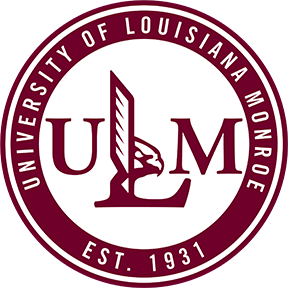


The ULM Honors Program is a unique program that seeks intellectually curious students who desire to challenge themselves with new ideas and to work with similarly motivated students.
The program is open to all majors and offers various options while working within the degree. Honors students are exposed to more in-depth topics and work closely with the Honors Faculty.
Honors students learn in smaller, discussion-based courses. Additionally, Honors students are eligible for exclusive Honors Housing in Bayou Suites, as well as extra Honors-only scholarships.
Any student may apply.
First-time, full-time freshmen who have at least a 27 composite ACT score or who have at least a 1210 SAT score simply fill out an online application.
Students who do not meet this requirement may still be admitted with two letters of recommendations and an exemplary GPA (in addition to the online application).
Transfer students may be eligible for admission based on their grades, two letters of recommendation, and completion of the online application.
See what a day in the life of a ULM Honors student looks like at Honors Invitational. Click here for more information on the next Honors Invitational event.
 From The Director
From The DirectorHonors students typically participate in smaller classes, allowing for greater interaction with faculty and discussion of relevant, in-depth topics. Honors students have greater access to resources to enhance their college experience including an honors lounge, honors scholarships, honors housing, and priority registration
I am excited about fostering excellence with gifted and exceptionally dedicated students.
As we progress into this year and the college careers of my colleagues, we learn more about who we are and what we can be. With the support of ULM's faculty, staff, and students, our program is taking flight!
Making sure your program is the right financial investment is an important part of the search process.
Honors students take smaller, discussion-oriented seminars from hand-picked professors in literature, fine arts, humanities, social sciences, and more.
Honors students have a 100% admissions rate into graduate and professional schools.
Honors students register for courses before the rest of the campus.
The ULM Honors Program offers two different types of certificates: honors in the college and honors in the university. All Honors distinctions will be awarded at graduation.
Honors students benefit from close interaction and individual discussions with faculty members.
Honors Scholarships are available on a competitive basis for students pursuing Honors certificates in the college or university.
ULM Honors Students have studied all over the world. Recent trips abroad include: Belgium, Morocco, Costa Rica, Peru, England, Spain, France, Greece, and South Korea.
ULM Honors graduates go on to work in a variety of high-paying jobs or into careers that change lives. Honors students have a 100% admissions rate into graduate and professional schools, so many ULM Honors graduates become doctors, lawyers, and business leaders. Our alumni help asylum seekers find safety, bring economic opportunities to impoverished regions, and launch products and services that improve the quality of life for people around the world. Whatever career path you choose, ULM Honors will guide you to become the best in the world at what you do.
Students take 16 hours of an Honors Core that fulfills the University Core. In order to complete the Honors Core, Honors students take Honors English, Honors Fine Arts, Honors Social Science, Honors University Seminar, and two Honors Humanities courses (one of which must be Honors Literature).
Upon completion of the Honors Core, students have two choices:
To graduate with Honors in the College, students must complete the Honors Colloquium (HONR 1001), Honors Senior Seminar (HONR 4010), and five Honors Contracts. Students must also have a cumulative grade point average of at least 3.4 by the time of graduation.
To graduate with Honors in the University, students must complete the Honors Colloquium (HONR 1001), Honors Senior Seminar (HONR 4010), five Honors Contracts, and Honors Project (to include two credits of HONR 4015). Students must also have a cumulative grade point average of at least 3.5 by the time of graduation.
Honors Contracts. The honors contract seeks to foster creativity and scholarship as well as to develop relationships with faculty. Students can obtain honors credit by doing honors-level work in academic courses or cocurricular activities that include, but are not limited to, creative performance, service-learning, internships, travel abroad, and other forms of research engagement.
Students arriving with prior credit for core courses may apply for course substitutions to satisfy honors requirements. Approval comes from the Director of the Honors Program.
HONORS FAQS
Would I do better in college if I did not join an Honors Program?
For some this is true, but for most it is not. Why? Honors Programs provide students
with a peer group that values academic excellence, so highly motivated students are
in classes with other highly motivated students that lead to study groups, academic
teams, and social networks to support each other. The transition to collegiate life
is not always easy. Honors Programs create an environment that makes it easier to
transition from high school to college. Consequently, students in Honors Programs
often perform better academically than students not in Honors Programs.
Are college Honors courses like high school Honors courses?
No, there is usually a world of difference between high school and college Honors
courses. In many high schools, Honors courses are just the normal courses made harder
with extra readings, extra assignments, and more rigorous grading. In college, Honors
courses are enriched courses. Honors courses avoid lectures in favor of discussion
and debate on important topics. Honors courses eschew passive learning in favor of
interactive methods with innovate materials covering cutting edge concepts. Honors
courses provide smaller environments, which allows professors to utilize techniques
and methods that cannot be used in larger, regular university courses.
Will Honors courses be too hard for me?
No. If you were accepted into an Honors Program, then you have the natural ability
to succeed in your Honors courses. You will gain even more confident in your own abilities
by working together with (not competing against) other highly motivated students on
campus. In Honors courses, students and faculty learn from each other and work with
each other. Honors courses, and their professors, are often so stimulating that students
barely notice the work they are doing and how much more they are learning.
Will my college GPA suffer if I join an Honors Program?
No, Honors courses are not graded harder than other college courses. Students find
the hardest courses are usually their upper-level, non-honors courses within their
major.
Can I participate in sports or other extra-curricular activities and still do Honors?
Absolutely, and you will meet many other students doing the same. Honors students
are able to participate successfully in athletics, Greek life, student government,
registered student organizations, and other extra-curricular activities. In fact,
Honors students often hold leadership positions and elected offices.
Wouldn’t it be better for me to wait a semester or two before joining the Honors Program?
It depends. Honors Programs are designed for first-time freshman since first-time
freshman have more time to complete Honors requirements. However, you can enter after
your first semester or even your first year.
Can I do an internship or study abroad if I am in an Honors Program?
Absolutely. Honors Programs strongly encourage internships and study abroad.
Will Honors separate me from other students at the college?
No, Honors students are as immersed in regular college life as regular students. Honors
students take a mix of Honors and non-Honors courses, and will find friends and roommates
in and out of Honors.
Are there conferences that I could go to as an Honors Student?
Yes. Students annually attend and present at national, regional, and local Honors
conferences paid for by the Honors Program.
Will participation in an Honors Program help me get a job, or get into graduate or
professional schools, after I graduate?
Yes, there is evidence that participation is an asset for your future. As an Honors
student you will be identified as possessing the commitment and motivation to take
on challenging work (supplemented by extracurricular involvement). Honors students
are eagerly sought out by employers and preferred for admissions by graduate and professional
schools. Your Honors research provides you with graduate-level experience to prove
your ability to work independently at an advanced level.
Learn more about financial aid options: https://www.ulm.edu/financialaid/
Learn more about scholarship opportunities: https://www.ulm.edu/scholarships/
Explore what the University of Louisiana Monroe has to offer



